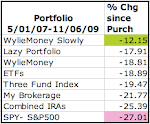I'm selling funds at a loss if I can find equal or better funds in the same fund categories to replace them with. I'm doing this to claim the losses against my 2008 taxes. This should increase the size of my tax return. I plan to take the extra cash and invest it, assuming the markt is still beaten down when I get my refund.
Back in March of 2007, Managers Bond MGFIX looked great. Other bond funds have held up well, but the managers of this fund have taken failure to a new level. It has lost over 21% this year and its expenses have actually gone up. I'll take TGMNX TCW Total Return Bond which has posted a slight gain year to date.
Another fund that looked good in March of 2007 was SSMEX, SSGA Emerging Markets. Most Emerging Market funds looked good then, but this one rose above the field. LZOEX has lost over 50% this year, but that is not as much as SSMEX. LZOEX has a better long term record, but slightly higher expenses, which bums me out a little. I'm sitting on too big a loss to not take the tax write off here so I'm selling SSMEX and buying LZOEX.
In January of 2007, AAGPX American Beacon Large Cap Value Planahead looked like a safe bet. Value funds have taken a serious beating, but many funds have held up far better than this one. I'm buying AMANX Amana Trust Income.
I bought JASCX James Small Cap well before I put together the WylieMoney portfolios. Despite that I'm sitting on a loss and there are better options. I'm buying RSEFX Royce Special Equity SVC.
Bond- Intermediate Term
Selling: MGFIX Managers Bond
Buying: TGMNX TCW Total Return Bond
Foreign- Emerging Markets
Selling: SSMEX SSGA Emerging Markets
Buying: LZOEX Lazard Emerging Markets Equity Open
Domestic- Large Cap Value
Selling: AAGPX American Beacon Large Cap Value Planahead
Buying: AMANX Amana Trust Income
Domestic- Small Cap Value
Selling: JASCX James Small Cap
Buying: RSEFX Royce Special Equity SVC
Subscribe to:
Post Comments (Atom)



4 comments:
I'm curious why you are choosing to sell funds that have performed poorly in a once in a lifetime market crash, and replacing them with funds with relatively large expense ratios, AMANX with 1.32% and LZOEX with 1.47%. Surely most funds have "gone bad" this year regardless of how they were faring in previous years simply due to investors panic selling. If you desire to sell for tax reasons, would it not make sense to buy funds that are even more deeply discounted than the funds you are selling, and also have lower costs?
Dibbler- your question is solid. Unfortunately I'm limited to no-load, no-fee funds offered by Etrade, so my options are not tremendous.
I did not sell the funds I sold because they lost value. All my funds except one lost value- a lot of value. (BTTRX is the one that has gained).
I sold these funds because they did far worse than their peers- other funds in the same fund categories. The two funds I chose have held up much better than other funds in the same categories. AMANX does have a higher than average expense ratio for its category. It is a "socially responsible fund," for what that's worth. I was mixed about this pick, but I'd rather pay quality managers to do a good job than skimp on expenses and wind up with terrible funds.
As far as LZOEX, of the 5 no-load no-fee emerging Market funds available through etrade with 3 stars or more, LZOEX is the only 4 star fund (no 5 star funds). the 1.48% expenses (according to etrade) are high, but only a little higher than SSMEX which has 1.28%.
SSEMX has lost 59.45% this year and LZOEX has lost 51.44%. So the loss far outweighed the difference in expense. I would not have sold, if I did not want the tax write-off.
The one other emerging market fund with lower expenses lost over 60% this year and has s higher turnover ratio, which often means higher taxes, so the costs of owning that fund may actually end up being higher.
So for better or worse, that was my thinking. Low expenses are critical, but only one factor I consider. A major one, sure, but being able to add to the fund monthly outweighs a slight reduction in expenses, and only no-load, no fee funds allow this.
Thanks very much for this. Using the rationale that in the Large Value space AAGPX did far worse than AMANX (down 38% versus 22%), could you also consider that in the Large Growth space, JAGIX did far worse than another Amana Trust Fund, AMAGX (40% versus 26%), so it might make a good replacement for the same reason?
Another question I had is whether the so-called "equity-income" funds now look like good value from a growth perspective as well, since they've been beaten down so badly, so we might expect some growth from them as well as dividend income?
Howdy Dibbler,
Yes JAGIX is another fund that has peers that performed better on the year. I am not sitting on a big loss in JAGIX though because of when I invested in it. So it did not make sense for me to replace it to gain a tax advantage.
"Another question I had is whether the so-called "equity-income" funds now look like good value from a growth perspective as well."
My 2 cents is that yes valve has a long way to come back. I would not call this 'growth,' however. Financial companies tried to behave like growth companies, making up and rapidly expanding in new markets, more rapidly than they had assets to leverage against. That did not work well. If anything, I think a number of financial markets will be curtailed and heavily regulated going forward. Sure, as credit markets loosen up, as investors actually see likelihood of solid profits, financial companies should rebound solidly and your investments in them should 'grow' but they won't grow in the same manner that traditionally labeled 'growth' companies do.
That take would likely be challenged by many. Here is another take.
Even though Value stocks have taken a beating, when they rebound, growth stocks may rebound even more. I recommend diversification.
Post a Comment